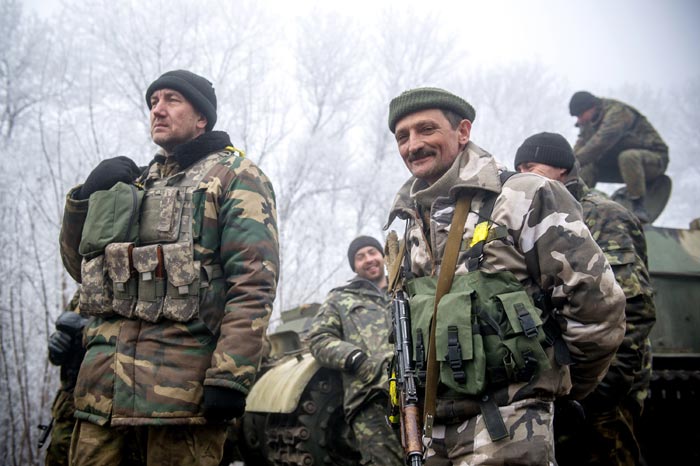Ukrainian servicemen relax on a road at Svitlodarsk, approaching Debaltseve on Sunday. A ceasefire in Ukraine was cautiously observed by both sides, despite accusations by Kiev and the US that Russia had fuelled a final push by rebels to gain territory before the deadline.
AFP/ Yenakieve/Ukraine
Occasional shelling thundered around a flashpoint east Ukraine town on Sunday despite a new, shaky ceasefire that took hold along the rest of the frontline dividing Ukrainian forces and pro-Russian separatists.
The sporadic bombardments targeting the key railway hub of Debaltseve - where thousands of Ukrainian soldiers are mostly surrounded by the rebels - were audible some kilometres away. Their intensity was far less than before the truce came into effect at 2200 GMT Saturday.
Ukraine's military said that across the entire conflict zone, its soldiers' positions had come under fire from the rebels 60 times on Sunday. Debaltseve, it said, was "the main hotspot".
The pro-Russian insurgents "shot using every kind of weapon, including Grad (multiple) rockets," military spokesman Anatoliy Stelmakh said.
"The rebels tried to storm our positions three times," he said, stressing that the Ukrainian forces were "only responding to attacks" and not instigating any themselves.
Stelmakh added, though, that "in general, the amount of Grad rocket fire has gone down across the whole conflict zone".
The separatists for their part said the truce was largely holding, but accused the other side of occasional breaches.
In Paris, French President Francois Hollande declared that observance of the ceasefire was "generally satisfactory" despite some "local incidents".
Hollande - who, with German Chancellor Angela Merkel, had helped mediate the ceasefire agreed on Thursday - was speaking after a four-way telephone conversation with Merkel and the leaders of Ukraine and Russia.
The truce is meant to be the first step of a peace plan aimed at ending 10 months of conflict that have claimed more than 5,480 lives.
First step in peace plan
The next phase is scheduled to see both sides pull their heavy weaponry back from the frontline within 48 hours of the ceasefire coming into effect, theoretically by 2200 GMT Monday.
Kiev is to start retaking control from the rebels over its 400-kilometre border with Russia, but only after local elections are held in the east by the end of the year. Under the deal, separatist-held territories are to be granted a degree of autonomy that will be established through talks.
But trust is low on all sides, and scepticism reigns after the collapse of a similar ceasefire agreed in September.
AFP journalists near Debaltseve said they heard sporadic artillery fire around the town on Sunday. They were unable to get closer because of the hostilities.
The strategic transport hub is seen as the position most likely to cause the latest ceasefire to fail. Ukrainian President Petro Poroshenko has warned that the truce was "threatened" by the separatist action there.
Rebels have warned that any attempt to move the thousands of government troops they claim to have trapped in Debaltseve will be seen as aggression and prompt a response.
Observers from the Organisation for Security and Cooperation in Europe (OSCE) who are mandated to monitor the truce say rebels had blocked their access to the town.
The ceasefire was "overall respected" but there was at least one exchange of artillery around Debaltseve, according to the OSCE.

